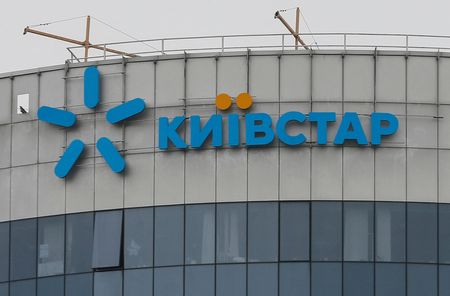 1
1 1
1

By Supantha Mukherjee and Toby Sterling
STOCKHOLM/AMSTERDAM (Reuters) – Thousands of telecom operator Veon employees are working from bomb shelters in Ukraine and moving equipment to border areas to maintain a digital lifeline for refugees fleeing the war, the company’s chief executive said on Friday.
Their work has helped some 85% of Veon’s telecom network remain operational in Ukraine since Russia’s Feb. 24 invasion, Veon CEO Kaan Terzioglu said in an exclusive interview with Reuters. But further risks loom both from electricity shortages and the conflict itself.
Amsterdam-listed Veon operates Ukraine’s biggest cell phone provider under the name Kyivstar with 4,000 employees and a 25% market share.
Terzioglu, who spoke by Zoom conference call from the Netherlands, described how the company is coping with war, sanctions and financial concerns at the same time.
Terzioglu provided a lens through which one company is providing a phone network to a rapidly spreading diaspora.
Employees “are practically working out of shelters and the moment they have the opportunity, they go out to the field to do maintenance,” Terzioglu said.
The parts of the network which are not working were mostly because of loss of power and are not being targeted by Russian forces, he said. Getting these parts back up required workers to run gasoline to generators, which Terioglu described as “one of the most logistically heavy jobs that our people are trying to do.”
Russia’s attack, which Moscow calls a “special operation” to demilitarize the country, has killed hundreds of civilians, reduced city areas to rubble and sparked a humanitarian crisis. Russia denies targeting civilians in the country of about 44 million.
More than 3.2 million people have fled and an additional 2 million have been displaced internally, United Nations data showed.
On the basis of cell phone data, Terzioglu estimated that 4 million refugees had left, and 10 million were displaced.
Apart from opening up its offices as refugee shelters, Veon has also topped up mobile accounts without charge, said Terzioglu, who became Veon’s group CEO last July. In his previous job as Turkcell CEO he grappled with the Syrian refugee crisis.
Veon has also received support from American, Chinese and European companies in the tech and telecom industry. While operators such as Orange, Tele2 and Vodafone have waived off interconnection and roaming charges, equipment makers such as Huawei and ZTE have been helping in network maintenance. These and companies including Ericsson, Nokia, Microsoft Corp, and Oracle Corp have made a “heroic effort” to keep the networks running, Terzioglu said.
RUSSIAN CONNECTION
Veon also owns the second-largest telecom network in Russia, operating under the name of Beeline, its most profitable market. That means Veon must navigate the impact of sanctions and political concerns on both sides of the border.
Veon has about 29,000 employees in Russia and the company has taken steps to operate its Ukraine and Russian businesses as separate from one another.
The company has also moved quickly to distance itself from Russian oligarch Mikhail Fridman, whose investment vehicle LetterOne holds a 47.9% stake in Veon, and an additional 8.3% economic stake through a Dutch foundation.
The European Union imposed sanctions on Fridman on Feb. 28, a decision he said he would fight.
Terzioglu said Fridman, who resigned from Veon’s board Feb. 28 and LetterOne’s board on March 3, now “has no economic interest in LetterOne.”
LetterOne, which did not respond to a request for comment, said March 3 that Fridman’s assets had been frozen and he had been stripped of shareholder rights.
Terzioglu said he could not speculate as to whether the company could eventually face EU sanctions or nationalization by the Russian government, but he hoped that it would be excluded on humanitarian grounds.
“We will do our best to position it as a service that is essential,” he said.
Veon also faces financial worries, with its shares down 56% in the year to date, and its U.S. dollar denominated debt – $5.4 billion worth at the end of 2021 – trading at distressed levels.
On March 4, Fitch downgraded the company’s credit ratings to junk status, saying that together Russia and Ukraine accounted for 62% of 2021 earnings before interest, taxes, depreciation and amortization (EBITDA) of $3.3 billion.
Russian capital controls and the war meant the company may not be able to move funds in or out of either country.
The company has issued several updates to reassure investors it remains liquid, with $2.1 billion in cash as of the end of February, of which $1.5 billion is in the Netherlands.
Terzioglu said he was aware of reports https://www.bnnbloomberg.ca/veon-bondholders-enlist-advisors-ahead-of-planned-debt-talks-1.1739259 of a group of bondholders seeking talks and welcomed the opportunity to address them, though none have reached the company so far.
“Having them organized gives us the opportunity to explain why they should not be worried, and that we are well funded in terms of meeting our obligations,” he said.
(Reporting by Supantha Mukherjee in Stockholm and Toby Sterling in Amsterdam; editing by Kenneth Li and Grant McCool)